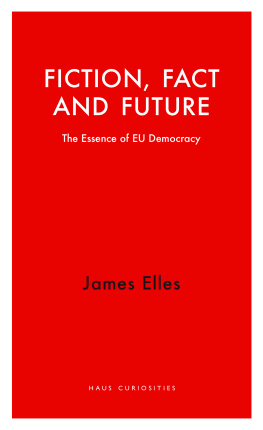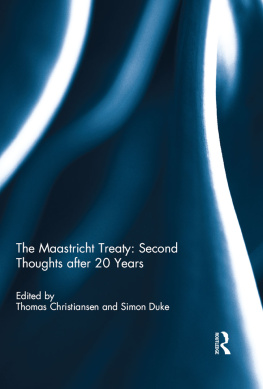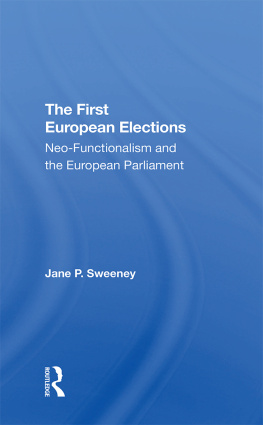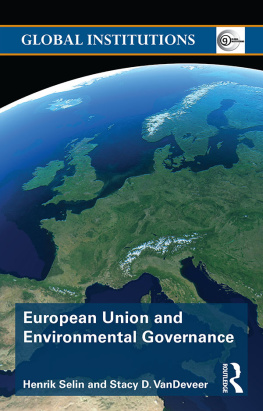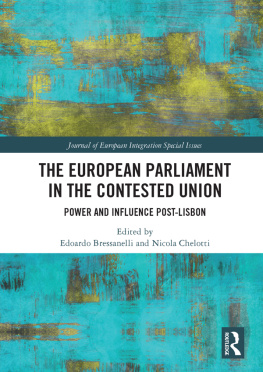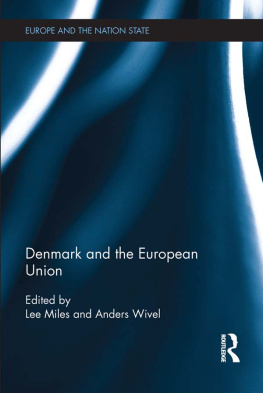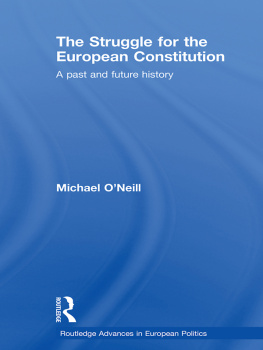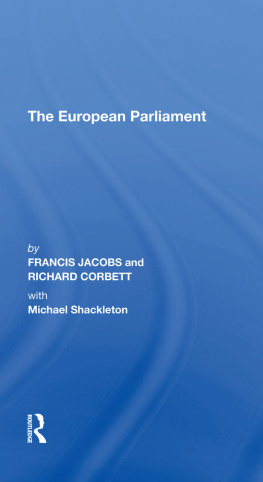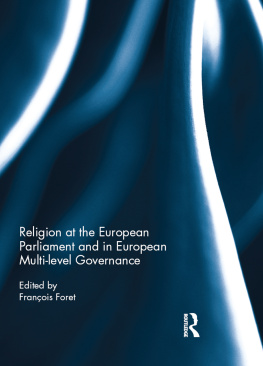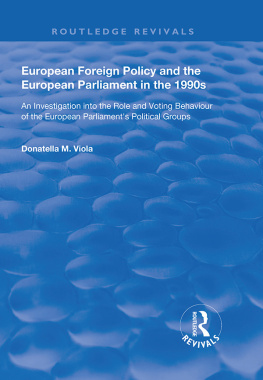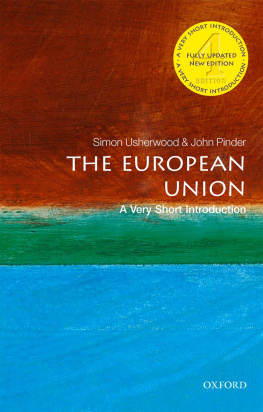About the Author
James Elles was a British Conservative Member of the European Parliament from 1984 to 2014. He is the Co-founder of the European Internet Forum and the Founder and Chairman of the Transatlantic Policy Network. He is also the Honorary President of the European Strategic and Policy Analysis System (ESPAS).
First published by Haus Publishing in 2019
4 Cinnamon Row
London SW11 3TW
www.hauspublishing.com
Copyright James Elles, 2019
The right of the author to be identified as the author
of this work has been asserted in accordance with
the Copyright, Designs and Patents Act 1988
A CIP catalogue record for this book is
available from the British Library
Print ISBN: 978-1-912208-04-3
Ebook ISBN: 978-1-912208-03-6
Typeset in Garamond by MacGuru Ltd
Printed in Spain
All rights reserved
Preface
For more than 40 years, I have experienced an invigorating journey working within European Union (EU) institutions, principally as a Member of the European Parliament (MEP) representing electors in the Thames Valley, in the South East region of the UK, for a continuous period of 30 years. During this time, nothing has diminished my profound belief that strengthening the capacity for the EU to act on behalf of its citizens is the right course to take. Along the way, I have participated in, or seen at close quarters, many of the defining moments of the era. The EU has changed beyond all recognition, from being a community of nine countries with limited powers at its disposal to accommodating 28 member countries and 23 languages, with substantive powers giving it a global reach.
It is beyond the scope of this book to recount all my experiences or give my reflections on many of the key issues now under debate. But what I hope to do is to draw the attention of a young generation and show them the critical importance of the EU, which is so little understood in the UK not least among our political leaders and commentators.
What this book seeks to illustrate is that there have been major changes to the way of life in our country over the past 45 years, through which we have helped create a remarkable organisation, enabling independent democratic European countries to find ways to resolve their differences together. They have done this not by being entirely nationalistic in their approach, but by realising that through sharing a limited degree of sovereignty they can increase the effectiveness of all of the EUs members to meet the major challenges ahead.
Unpredictability is a key factor in the world today. Though many trends can be identified to show how our societies are adapting at a revolutionary speed to new technologies with connectivity and digital transformation affecting our environments in contrast, British political attitudes have been moving at a snails pace in terms of adjusting to changes in European institutions. The story of Britains membership of the EU provides a cautionary tale of how not to make a success of the venture.
I hope that the insight arising from this book, underlining the vital importance of the EU to the stability and prosperity of our environment, will give hope to those who may shortly no longer be EU citizens, so that they are empowered to act and avert what could be a real tragedy for the UK.
Acknowledgements
The subject of this book is a story which has no end the evolving nature of Britains relationship with the EU as they both adjust to accelerating global change. As the title implies, it provides personal insight based on experiences I have had of the adjustments which have so far taken place, and explores what potentially lies for us in the decade ahead.
I am indebted firstly to Haus Publishing for giving me the exceptional opportunity at this historic moment to publish these reflections. Secondly, to those many colleagues and friends who have given me ideas which are freely expressed in the text. Lastly, but not least, to my family and in particular my wife Caroline who has been so supportive and inspirational.
GERALD: I suppose society is wonderfully delightful!
LORD ILLINGWORTH: To be in it is merely a bore, but to
be out of it simply a tragedy.
Oscar Wilde, A Woman of No Importance
1
Fiction
Thanks to the votes cast by the British people in the referendum on 23rd June 2016, the UK decided to leave the EU. Looking back over the period of membership, there have been many times, not least since the referendum, when it has been legitimate to ask whether we as a country really ever understood what our commitments to EU membership were. As we shall see, many politicians were (and still are) seemingly totally unaware of the nature of the EU institutions and of their legal obligations and the fundamental fact that the EU is a rules-based legal system with elected representatives to help create the laws applying to all its people.
I should explain that, during my professional life, I have had a greater opportunity than most to observe this at close quarters, having started working at the European Commission in February 1976, starting as a stagiaire (trainee) before becoming a full-time administrator on both commercial and agricultural policy for a seven-year period. On leaving the European Commission in June 1984, I was elected as an MEP for the European Parliament constituency of Oxford and Buckinghamshire. I remained an elected MEP for 30 years before voluntarily standing down in June 2014.
The general lack of understanding of the EU was nicely put He ended the piece by indicating that the UK had failed to cooperate effectively within the EUs systems:
The British political class increasingly resembles a British tourist asking a foreigner for directions: unable to make itself understood, it simply shouts louder. Complaints about EU theologians only reveal a worrying lack of understanding of the realities of an organisation of which the UK was a member for 43 years. If Britain is to avoid finding itself unexpectedly stranded without a deal in March, it will need to start learning the language.
On being elected as a MEP in June 1984, I found myself with a European Parliament constituency of around half a million voters stretching across the Thames Valley. The experience was a sharp learning curve, but I had the good fortune to share a parliamentary office in Amersham with the MP Ian Gilmour, Baron Gilmour of Craigmillar (who was then Sir Ian Gilmour), as well as benefitting from the advice of a canny political agent, Robert Nairne. Furthermore, not only did I have the luck to be a full-time member of the Budget Committee in Brussels, but I also started a regional network called TARGET to promote training in skills and technologies with my neighbouring MEP (my mother, Baroness Elles!). As it turned out, TARGET was a highly successful venture reaching more than 5,000 small and medium-sized enterprises across the Thames Valley, linking businesses with colleges and training providers.
But my incoming enthusiasm to do things for my voters in the Thames Valley was soon dampened by some advice which I received from the Party Chairman at the time, Norman Tebbit, during a visit to 10 Downing Street to meet the Prime Minister, Margaret Thatcher, with my MEP colleagues. When I told him about my interest in doing things for constituents, he said to me privately, Dont bother with that. That is not your task. Your duty is to tell those in Brussels what we think of them. We will look after the rest!

